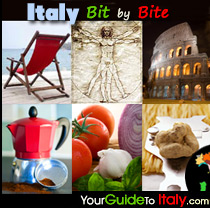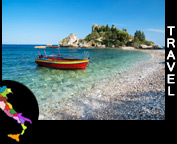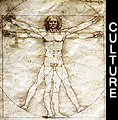The name Italy (Italia) is an ancient name for the country and people of Southern Italy. Originally is was spelled Vitalia, probably from the same root as the Latin vitulus (a one-year-old calf), thus literally meaning 'calf-land' or "Land of Cattle". The area was rich with bovine, and the people living there probably took the name symbolically since it identified them with their land.
In the times of the Magna Grecia, following the Greek colonization of the majority of territory of the Itali, who lived in the southern part of present-day Calabria, were renamed Italoi, the Greek word for Vitulus.
The Osci, a tribe living around the Bay of Naples, kept cattle and calves on the fertile grasslands of Campania. In their native language, an Italic language known as Oscan, their country was named Viteliu, which also means 'calf-land', because the region was renowed for the excellence and abundance of its cattle.
The name "Italy" was later extended by the Romans first to cover Southern Italy and later to include the entire peninsula.
Coins bearing the name Italia were minted by an alliance of Italic tribes (Sabines, Samnites, Umbrians and other) competing with Rome in the first century B.C.
By the time of emperor Augustus approximately, the multi-ethnic territory of Italy was included in Italia as the central unit of the Empire; Cisalpine Gaul, the Upper Po valley, for example, was appended in 42 BC.
After the fall of the Western Roman Empire and the Lombard invasions, "Italy" or "Italian" gradually became the collective name for diverse states appearing on the peninsula and their overseas properties.
A popular explanation for the etymoloy of the word is that it stems from an episode of the Labors of Hearcles in Greek Mythology when Eurystheus ordered the hero to bring him the cattle of the monster Geryon. Just as Hercules was escaping with the cattle and bringing it back to Eurystheus, a bull got loose at Rhegium and jumped into the sea. The bull swam to Sicily and then made its way to the neighboring country. The native word for bull was "italos," and so the country came to be named after the bull, and was called Italy.
.
.
.








